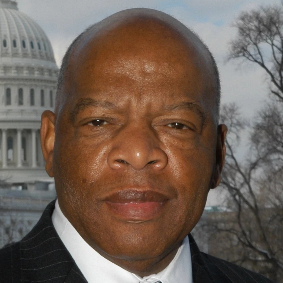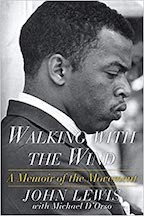 John Lewis, a congressman from Georgia and an icon of the civil rights movement, died on July 17. He was 80 years old and had suffered from pancreatic cancer.
John Lewis, a congressman from Georgia and an icon of the civil rights movement, died on July 17. He was 80 years old and had suffered from pancreatic cancer.
Lewis was one of the original Freedom Riders. He chaired the Student Nonviolent Coordinating Committee and was the youngest speaker at the March on Washington in 1963. He was beaten on the Edmond Pettus Bridge in Selma, Alabama on Bloody Sunday in 1965 as he marched to secure voting rights for African Americans. He represented Atlanta in the U.S. House of Representatives for 33 years.
 A native of Troy, Alabama, Lewis was the son of sharecroppers. He once said that when he was six years old, he had only seen two White people in his entire life. Lewis graduated from the American Baptist Theological Seminary in Nashville and earned a bachelor’s degree in religion and philosophy at Fisk University in Nashville. As a student in Nashville, he became active in the civil rights movement by participating in lunch counter sit-ins and other protests. Lewis was beaten on several occasions and was arrested for protesting more than 40 times. Later, he was the author of Walking with the Wind: A Memoir of the Movement (Simon & Schuster, 1998).
A native of Troy, Alabama, Lewis was the son of sharecroppers. He once said that when he was six years old, he had only seen two White people in his entire life. Lewis graduated from the American Baptist Theological Seminary in Nashville and earned a bachelor’s degree in religion and philosophy at Fisk University in Nashville. As a student in Nashville, he became active in the civil rights movement by participating in lunch counter sit-ins and other protests. Lewis was beaten on several occasions and was arrested for protesting more than 40 times. Later, he was the author of Walking with the Wind: A Memoir of the Movement (Simon & Schuster, 1998).
President Obama stated that Lewis “loved this country so much that he risked his life and his blood so that it might live up to its promise. And through the decades, he not only gave all of himself to the cause of freedom and justice, but inspired generations that followed to try to live up to his example.” President Obama awarded Lewis the National Medal of Freedom in 2011.
The Congressional Black Caucus issued a statement that read in part: “The world has lost a legend; the civil rights movement has lost an icon, the City of Atlanta has lost one of its most fearless leaders, and the Congressional Black Caucus has lost our longest-serving member. The Congressional Black Caucus is known as the Conscience of the Congress. John Lewis was known as the conscience of our caucus.”










